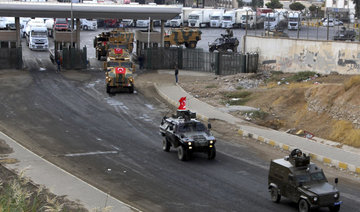Al-Qaim: The US-led coalition’s newest outpost in the fight against Daesh is in a dusty corner of western Iraq near the border with Syria. Here, several hundred American Marines operate close to the battlefront, a key factor in the recent series of swift victories against the extremists.
The Americans directed Iraqi troops in their victory last week recapturing the nearby border town of Al-Qaim, the militants’ last urban holding. Now the Marines will lead the equally difficult task of clearing the extremists from their last redoubt: A large stretch of empty desert north of the Euphrates River adjoining the border with Syria.
They also face the possibility of friction with Iranian-backed Iraqi militias that are increasing their own presence in the border region.
Under a plastic tent, the Marines run an austere joint command center about 20 km from the border. A dozen monitors relay surveillance footage and troop positions in the town of Al-Qaim nearby. Using racks of radio and satellite equipment, the coalition forces and Iraqi officers at the base pass information between forces on the ground and Al-Asad Air Base, the coalition’s main base in Anbar province some 130 km to the east.
Such outposts have become more common the past year, bringing the Americans out of main bases and closer to the action. US commanders say the tactic has paid off in the swift rollback of Daesh.
The capture of Al-Qaim completed the sweep driving Daesh from major towns along the Euphrates Valley in Iraq. Along the river on the Syrian side, Syrian regime forces took the city of Deir Ezzor last week.
All that remains from the so-called “caliphate” that once stretched from northwest Syria to the edges of Baghdad are a small stretch of villages on the Euphrates in Syria and the enclave of desert straddling the border into both Syria and Iraq.
US Marines Col. Seth W. B. Folsom, commander of Task Force Lion, oversaw the Al-Qaim fight and said he expects clearing and holding the retaken territory in Anbar to be more difficult than the assault itself.
“It’s much more challenging, no doubt in my mind it’s more challenging,” he said. Motivating troops to attack to regain their country is easy, he said. “What’s less easy to motivate men to do, is to stand duty at checkpoints.”
Much of Anbar and Iraq’s border with Syria has been beyond central control for decades. The deserts there have served as havens for smugglers for generations.
Iraqi forces are stretched thin. Many are deployed in support of local police in liberated towns and cities and along major roadways. Others have been diverted to the borders of the Kurdish region amid the military standoff between Baghdad and Kurdish forces.
Iraq’s Popular Mobilization Units (PMU) have also built up their presence along Iraq’s border with Syria.
They make no attempt to hide that they are working to physically extend the influence of US rival Iran. Jaafar Al-Husseini, a spokesman for the Hezbollah Brigades, a group under the PMF, boasted during the Al-Qaim fighting that the forces are securing a route from “Iran to Beirut.”
“We have foiled the American project in Iraq and on the Syrian borders, and we have succeeded in securing the road that links Iran, Iraq, Syria and Lebanon,” he told The Associated Press.
Coalition forces do not directly coordinate with the PMU, but rely on the Iraqi military to relay their movements to avoid striking the fighters.
US Marines Maj. Greg Duesterhaus said the PMU presence complicates things but is not a great concern. “They are part of the forces that are out there on the battlefield,” he said.
The growing numbers of coalition troops are stretching the capacity of Anbar’s bases. Notices warning of water shortages hang in bathrooms and showers at Al-Asad. At Al-Qaim, Marines ration water.
“Anbar is the far reaches of Iraq,” said Col. Folsom. “The challenge that we’ve got here that they have not had as much up in the north is really just the tyranny of distance.”
Daily convoys leave from Al-Asad to the Al-Qaim outpost carrying water, food, ammunition and building supplies. They travel along desert roads for a tedious seven-hour journey. Storms whip up powder-fine sand, reducing visibility and halting traffic for hours. Lack of Iraqi military escorts sometimes leaves convoys stuck for hours.
Without electricity, cell phone service or the Internet, Marines at the Al-Qaim outpost pass the evening hours smoking cigarettes and talking.
Sitting between an armored vehicle and the rubble of a partially collapsed building, a group of Marines and soldiers joked about camp conditions and the monotony of their field rations. They also reflected on their mission in Iraq with a mix of sobriety and cynical humor.
They may feel a sense of accomplishment in the gains against Daesh — “but it’s not a sense of finality,” one Marine staff sergeant said. He served in Anbar in 2007, unlike most of his comrades, who are on their first deployment to Iraq. He never thought he’d be back, but now believes there will be a US presence in Iraq for generations to come.
“When my son joins the Marines, he’ll probably be deployed to Iraq,” he said with a laugh. He spoke on condition that he only be identified by his rank in line with regulations.
Col. Folsom said he hoped within the next year Iraqi forces would be able to hold the western edge of Anbar on their own and coalition forces can fall back to Al-Asad air base.
“We have to find some sort of sustainable presence,” he said. “What that will look like, I don’t know. There may still be some commuting to work in one way or another.”
As caliphate crumbles, US builds outposts in western Iraq
As caliphate crumbles, US builds outposts in western Iraq














